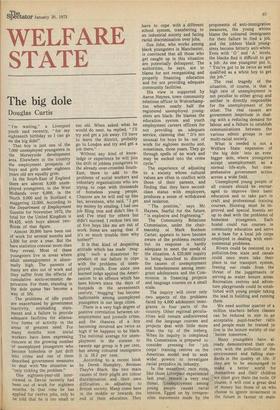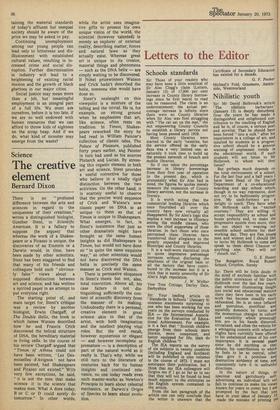WELFARE STATE
The big dole
Douglas Curtis
"I'm waiting," a Liverpool youth said recently, "for my eighteenth birthday so I can go on the big dole!" That boy is just one of the 7,000 unemployed youngsters in the Merseyside development area. Elsewhere in the country the employment prospects of boys and girls under eighteen years old are equally grim.
In the South-East of England there are almost 8,000 unem ployed youngsters, in the West Midlands over 6,000, in the North 9,000 and in Scotland a staggering 12,000. According to the Department of Employment Gazette for November 1972, the total for the United Kingdom is 68,425, with boys almost twoehirds of that figure.
Almost 30,000 have been out of work for several months and 1,500 for over a year. But the bare statistics conceal more than they reveal. Most of these Youngsters live in areas where adult unemployment is abnormally high. The parents of many are also out of work and they suffer from the effects of cumulative socio-economic deprivation. For them, standing in the dole queue has become a way of life.
The problems of idle youth are exacerbated by government inactivity, misleading state ments and a failure to provide adequate facilities for alterna tive forms of activity in the areas of greatest need. For many months now, social workers have been expressing concern at the growing number of unemployed youngsters who become homeless or just drift into crime and one of them described government measures to deal with 'the situation as "only tickling the problem."
One eighteen-year-old interviewed in Devon recently had been out of work for eighteen months. In that time he has applied for twelve jobs, only to be told that he is too small or too old. When asked what he would do next, he replied, " I'll try and get a job away. I'll have to leave the district, probably go to London and try and get a job there."
Without any kind of knowledge or experience he will join the drift of jobless youngsters to the already over-crowded SouthEast, there to add to the problems of social workers and voluntary organisations who are trying to cope with thousands of homeless young people. Chances are he will end up like Ian, seventeen, who said, "I get my money by stealing. I had one job filing iron and didn't like it and I've tried for others but didn't succeed. I reckon two out of five boys like me are out of work. Some are saying that if it's so much trouble then why bother?"
It is that kind of despairing attitude which has made ' mugging ' such a disastrous byproduct of our failure to cope with the problems of unemployed youth. Ever since one learned judge applied the Americanism to an offence which has been known since the days of footpads in the seventeenth century, ' mugging ' has become fashionable among unemployed youngsters in our large cities.
There is a very high degree of positive correlation between unemployment and juvenile crime, and the chances of a boy becoming involved are twice as high if he happens to be black. The national average for unemployment in the sixteen to twenty age group is 8 per cent, but among coloured immigrants it is 16.2 per cent.
According to a recent book by Derek Humphry, Because They're Black, the two main causes of their plight are colour discrimination and their own difficulties in adjusting to British society. Many come here in the middle or towards the end of their education. They have to cope with a different school system, transferring to an industrial society and facing racial discrimination over jobs.
Gus John, who works among black youngsters in Manchester, is convinced that all those who get caught up in this situation are potentially delinquent. The authorities, he says, are to blame for not reorganising and properly financing education and for not providing adequate community facilities.
His view is supported by Aaron Haynes, town community relations officer in Wolverhampton where nearly half the registered unemployed youngsters are black. He blames the education system and youth employment careers officers for not providing an adequate service, claiming that "It's not unusual for boys to be out of work for eighteen months and, sometimes, three years. They go through spells of no work and may be sucked into the crime cycle."
The experience of adjusting to a society whose cultural values are often in conflict with those of their parents, and finding that they have secondclass status with employers, produces a sense of withdrawal and isolation.
"The position," says Mr. Haynes, fearful for the future, "is explosive and frightening."
The Community Relations Commission, under the chairmanship of Mark Bonham Carter, appears to have become aware of the problems recently but its response is hardly adequate to meet the needs of the situation. A £25,000 inquiry is being launched to discover the causes of unemployment and homelessness among immigrant adolescents and the Commission is financing projects and language courses on a small scale.
The inquiry will cover only two aspects of the problems faced by 4,000 adolescent immigrants in four parts of the country. Other regional peculiarities will remain undiscovered and the language courses and projects deal with little more than the tip of the iceberg. When its inquiry is completed the Commission is prepared to consider pressing for 'job corps' training centres on the American model and to seek wider powers to investigate racial prejudice in industry.
In the meantime, race riots, like those Liverpool experienced last year, remain a very real threat. Unemployment among young people causes racial tension. Egged on by irresponsible statements made by the proponents of anti-immigration measures, the young whites blame the coloured immigrants for their failure to find a job, and the jobless black youngsters become bitterly anti-white. Even with ' 0 ' and ' A ' levels, the blacks find it difficult to get a job. As one youngster put it, "You've got to be twice as well qualified as a white boy to get the job."
The real. tragedy of the situation, of course, is that a high rate of unemployment is not peculiar to either group and neither is directly responsible for the unemployment of the other. The real causes are government ineptitude in dealing with a reducing demand for labour and a failure to establisti communications between the various ethnic groups in our multi-racial society.
What is needed is not a Welfare State expansion of 'the big dole' into an even bigger dole, where youngsters accept unemployment as a normal life-style, but comprehensive government action across a wide field.
Unemployed young people of all colours should be encouraged to improve their basic education and to take part in craft and professional training courses. Housing must be improved and special hostels set up to deal with the problems of homeless youngsters. Each hostel could run courses in community education and serve as a base for a local job corps employed in dealing with envi. Konmental problems.
Rivers could be restored to a pollution-free state and canals could once more take their place in our transport system, freeing our roads from the threat of the juggernauts or serving as water leisure areas. Recreation centres and adventure playgrounds could be established with young people taking the lead in building and running them.
We need another quarter of a million teachers before classes can be reduced in size to an acceptable. pupil-teacher ratio and people must be trained to live in the leisure society of our 'better tomorrow.'
Many youngsters have already demonstrated their concern with the pollution of the environment and falling standards in the quality of life. If they are to be encouraged to make a better world for themselves and their children we must give them the tools. Of course, it will cost a great deal of money but those of us who choose to ignore investment in the future in favour of main taming the material standards of today's affluent but unequal society should be aware of the price we may be asked to pay.
Continuing unemployment among our young people can lead only to bitterness and disillusionment with established cultural values, resulting in increased crime and social disruption. Further discrimination in industry will lead to a heightening of existing racial tension and the growth of black ghettoes in our major cities.
Social justice may mean more than a job, but meaningful employment is an integral part of a full life. We must ask ourselves, before it is too late, if we are so well endowed with human resources that we can afford to throw kids of eighteen on the scrap heap. And if we do, what kind of monster may emerge from the waste?



































 Previous page
Previous page